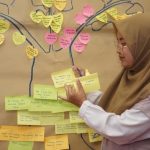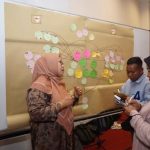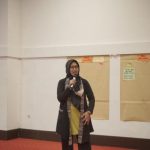Gender inequality experienced by women in access to renewable energy will cause women to be trapped in powerlessness. Strengthening gender equality for equitable access to renewable energy is important to carry out. For this reason, the GALS (Gender Action Learning System) approach is provide to beneficiaries through training to narrow the gender gap that exists in society. The GALS training focuses on gender equality in development activities and business models, which in this case are related to renewable energy access. This training will help increase gender and social awareness by applying the GALS approach to narrowing the gaps that exist in society.
Based on the results of the initial assessment conducted at three KWTs in three villages in Central Lombok Regency, namely KWT Kaki Rinjani in Karang Sidemen Village, KWT Suli Asli in Aik Berik Village, and KWT Elong Tuna in Lantan Village, it is known that the commodities produced are coffee and also snacks such as banana chips, banana jam, and other preparations. The processing of these commodities requires ten to twelve hours per day for coffee and banana jam production. In the processing process, there are drying step that take the most time because they still use conventional methods (drying in the sun). This conventional drying process also has challenges during rainy weather, so it often produces coffee beans with uneven drying and poor coffee quality. In addition to the drying, long working hours are also involved in frying coffee or bananas. Most of the fuel used today still uses firewood obtained from buying or taking it from the garden to the forest.
The processing process, especially during the drying and frying stages, is still mostly carried out by women, while along with this process, women are still burdened with domestic household work (cooking, sweeping, washing, and others). As a result, women have little opportunity to be involved in social activities in the village, get access to training, and access to information is still minimal.
“Men and women created with equal rights and obligations, so women should have the same access as men. And in the production chain, women and men have equal roles.” Said Yuni Riawati, Gender Officer Prowomen for Renewable Energy.
The applied GALS approach describes current problems that occur within the village or beneficiary environment. The GALS also conveys the dreams of each group, so that opportunities can be identified to achieve dreams related to gender mainstreaming and entrepreneurship through the renewable energy access. The results of the assessment before the GALS training was carried out proved that in business trips and daily life, women took more roles in production activities, and were also burdened with domestic household work, but access to information was still very minimal, especially related to renewable energy. Through GALS training, all groups (KWT, women entrepreneurs, coffee farmers, and young people) are given an overview of the condition of women in business activities, so that all groups can understand what each group can do to narrow the gender gap.
The analysis used in the GALS training such as dream business trips, renewable energy business trees, and market mapping can explain the current conditions in each village to what dreams each village can achieve at the end of the program. The hope is that through GALS training by developing an action plan, accompanied by the enthusiasm and consistency of the beneficiaries, and the presence of the local government with supportive policies, there will be good changes for beneficiaries in getting access to renewable energy and minimizing gender gaps.
“As women who are entrepreneurs, the burden of household chores is a challenge, but in that way, we can become extraordinary women.” Said Rukiyah, an Entrepreneurial Woman from Aik Berik Village.





